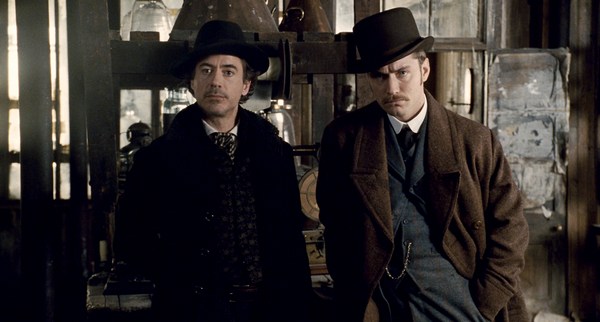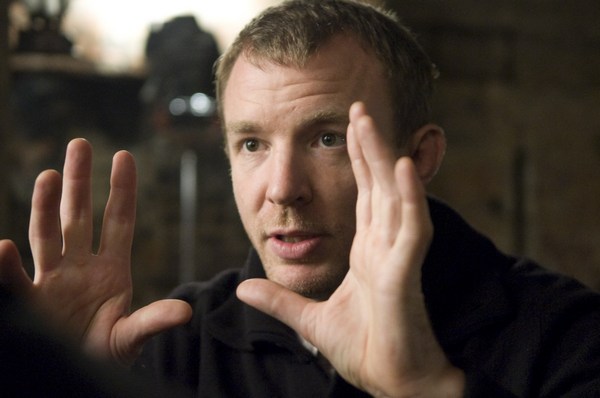|
|||||||||||||||||
January 2010 Web Edition © Jessie Lilley |
|||||||||||||||||
|
Mondo Cult
Articles
Features
Interviews
Books
News
Film
Music
Blog
Forum
Staff
Back Issues
Links
Contact Us
Legal
Index
|

Sherlock Holmes2009 / Warner BrothersDirected by Guy Ritchie
I wasn’t sure I wanted to see this film when I first heard about it. I’m a hard core Jeremy Brett fan and although I was raised on Rathbone, I have a hard time picturing anyone other than Brett in the role. Controversy and argument within the Sherlockian circles pushed me into the theatre however, as I had to see for myself what all the hoorah was about. Much of the bellowing was over when the story takes place. Based on the Irene Adler character appearing in the film, it has to be 1888 or later. It is now simply a question of how long after 1888? Downey mentioned 1890 on Letterman and that seems reasonable as Reichenbach took place in May of 1891. I'll accept Mr. Downey’s pronouncement as so based on the fact that Holmes in this film, notes that current occurrences are happening in November and it is clear that he is on the scent of Moriarty by the time the film ends. It should also be noted that newspapers shown in certain scenes are dated 1890, which in itself ends all speculation. No doubt the next—which I am certain will appear sooner than later—will bring us to the fall at the Falls. As I recall, he tracked the rogues for months—not years—and December through May would comfortably fall within that time line. I have to say that I was delighted with Mr. Downey's work. Not only did I immediately accept him as the character and forgot I was watching Downey, but I realized after I left the theatre that at one moment in the film, while discussing a recent turn of events, I heard Jeremy Brett speak a word of dialogue. So help me, Downey did a perfect impression of Jeremy's delivery, thereby tipping his hat to he whom I believe to be the master in the role, then smoothly reinstating his own characterization and making the character his own. I believe the torch has been well and properly passed.  Robert Downey, Jr. (L) and Jude Law (R) as Sherlock Holmes and Dr. John Watson Jude Law's Watson was a revelation. I love the characterization, the gambling problem, the inability to commit to Mary and Holmes' playing on that. The fact that it drives Watson to buy the perfect ring and firmly put Holmes in his place makes me wonder if Holmes really does want Watson to marry her or if he simply finds himself hoist; in itself a three-pipe problem, I think. Loved the bit in the alley with the fortune teller; lord I laughed at loud at that lovely performance by Bronagh Gallagher. Right up to the top and then teetering there but not quite falling over; worthy of Vincent Price, that. But back to the Mary problem again, I've never seen such a show of obvious displeasure as Sherlock Holmes arriving for dinner unshaven; in my eyes an outrageous insult, which the excellent Miss Morstan dismisses as unimportant by the simple act of not addressing it. I hated Kelly Reilly, though. No. I hated Mary Morstan. No. I disliked Mary Morstan. No. Oh, all right, I guess she'll do. I feel rather like Holmes regarding this good lady. When my husband David and I returned home after viewing this film, I realized how perfect Reilly was in the role. It wasn't until then that I suddenly was struck by the fact that both Holmes and I finally accepted Mary as inevitable at the same time in the film. The woman manipulated me beautifully—Reilly, I mean. This interloper, bent on removing Dr. Watson from 221B Baker Street, was not to be borne. She was destroying the greatest detective team in history, and I didn't want to see that happen. Reilly's Mary however, was no slouch and not interested in seeing a fine friendship dissolved; in fact, she was far more accepting of it than other women I have known in similar circumstances. Reilly's Mary Morstan had the rare gift of knowing that the man she fell in love with would not be the same fellow were he removed from close association with his boon companion, Sherlock Holmes. Therefore, she was willing, even eager, to let that association continue within certain limits. Obviously she expected her husband to live with her. Otherwise, she fully expected him to spend a great deal of time with his good friend. One thing for sure, our Mary knew she'd be never bored as long as Holmes was in the picture. I feel she was perfect.  Kelly Reilly (L) and Jude Law (R) as Mary Marstan and Dr. Watson It's interesting to me to note that when reading the Canon, lo these many moons ago now, I found her to be a completely forgettable character. This film has given the woman a personality and strength of character that she never before enjoyed. My hat is off to the triumvirate of screenwriters Johnson, Peckham and Kinberg and director Ritchie, not to mention Miss Reilly herself, for presenting an actual woman for Watson to fall in love with, rather than the previous cardboard cutouts that have left me, for one, totally disinterested. Since I mention the writers, I’d like to take a moment to congratulate them for presenting a plausible pastiche melding the Canon with the supernatural and culminating in a plot that only one such as Holmes could hope to unravel. We come now to The Woman. Irene Adler, the New Jersey doxy who learned her airs and graces on the operatic stage and bested Sherlock Holmes in spectacular fashion during the Bohemian affair. She scrubbed up nice, our Irene, but was after all, a woman of low birth who knew her way around.  Rachel McAdams as The Woman, Irene Adler In 1984, Gayle Hunnicutt portrayed the redoubtable Irene in A Scandal in Bohemia to Jeremy Brett’s Sherlock Holmes. I didn’t like her in the role. She was far too refined, in my opinion. Hunnicutt is also a stunning beauty and I pictured the character as pretty but with a hard core that came through in her eyes no matter how hard she tried. I always suspected her of being no stranger to the streets and wasn’t in the least bit surprised when in this film, she easily disarmed her attackers in the alley and blithely lifted a billfold, thereby adding to her stash of ill-gotten gains. That she should find herself uncomfortable with her new employer didn’t surprise me in the least; she recognized her betters when she met them, just as she knew a worthy adversary when she first encountered Holmes. Rachel McAdams presented all this and more in her portrayal of the character and I applaud whomever it was that made the casting decision. She was a joy. This leads me to consider the relationship between Holmes and Adler and indeed brings me to the point in the film with which I am most pleased. In fact, the relationship can be read in different ways. Moriarty has hired Adler to distract Holmes by using his supposed feelings for her as a means of keeping him off the scent. From this, we assume Holmes is smitten with Adler and moviegoers can read it as they will. For myself, I believe Holmes is not smitten with her, but obsessed with the fact that he was bested. I found no reason to think Holmes found her in any way attractive; indeed what I read in the story was that he viewed her as the aforementioned worthy adversary and in off times would brood over how she had managed it. I believe the Adler character was aware of that for even as she attempted to entrance him, her eyes reflected her failure at every turn. For his part, Holmes seemed totally unmoved and sometimes confused by her attentions, barely responding at all and confirming his indifference at the end of the film. Getting Sherlock into the sack strikes me as banging one's head against a brick wall; the only thing you gain by doing so is a headache. There then, are the big four and what your reviewer thinks of them. The rest present well-rounded performances and amusing characters here and there as one would expect to find in Holmes’ London. A special nod to the long suffering Lestrade, whom Eddie Marsan has a field day with while the character gets to have it both ways. Moriarty’s lapel appears in the film but we have yet to see the villain, though the gent attached to the lapel was played by Ed Tolputt and credited simply as the Anonymous Man. If things progress as I expect, we’ll meet up with him in the next of what I hope will be a series of films and with luck, they will have scripts as enjoyable as this. Yes, the film has a certain amount of pyrotechnics that one wouldn’t necessarily expect in Victorian London, but all reasonable and frankly, I think they are needed to draw in a younger crowd. Let’s face it folks, it’s all about getting asses in seats and things that go boom will bring in the younger generation every time. I will say I was sorry to see the film so ill-attended but must note that it was a Saturday matinee in a small town almost a month after the film opened. Tricks of the directing style all fit comfortably into the Holmsian genre, with the memory flashbacks presented as filmed segments rather than verbal retelling; the journey into Holmes’ thought process was a revelation. Watching as the character lost himself in thought and then ‘seeing’ what went through his mind works not only as a neat little theatrical device but again brings to mind the desire to present the film and its legendary characters to a younger audience by playing to a shorter attention span. All the time remaining true to Victorian London and not dragging the story kicking and screaming into the 21st Century. Well played Mr. Ritchie; nicely done, indeed.  Guy Ritchie, doing his thing on the set of Sherlock Holmes. The sets were exquisite; no one has yet to fully present the filth of Victorian London at the end of the 19th Century, but then who really wants to see it? The backdrop to Sherlock Holmes is gray, wonderfully gray and sooty, wet and sticky and furthering the vivid colors of the characters themselves; bringing them to vibrant life as well as sharply contrasting the sumptuous indoor world of the aristocracy with that of the world in which the majority of people dwell—magnificent. Hans Zimmer’s score is one of the finest I’ve heard in a very long time. Stirring, frightening, comical; the film would be worth the ticket price for the music alone. Couple that with The Dubliners’ performing their arrangement of the now-classic two-chord version of “The Rocky Road to Dublin” and you’ve got something that I must add to my collection as quickly as possible. All in all Sherlock Holmes presented the most enjoyable 2 hours and 9 minutes that I’ve spent in a movie theatre in a very long time. I am delighted to welcome The Great Detective back to the big screen and expect, and look forward to, another installment. — Jessie Lilley |
||||||||||||||||



